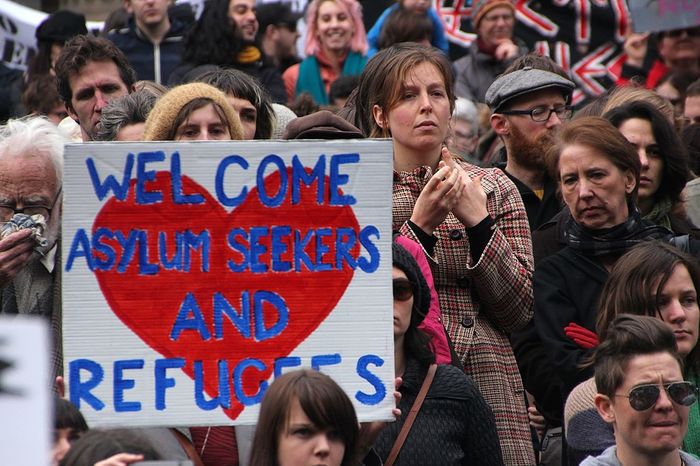The dehumanising language of the refugee crisis
Following news headlines about tragic channel crossings, Famke Veenstra-Ashmore analyses the ways in which language is manipulated in the discourse of the refugee crisis

Content note: This article contains mentions of death, racism, and xenophobia
‘27 migrants dead in the channel’. That’s the headline that has been dominating our news cycle and social media for weeks. The seemingly pressing need to define the people involved as ‘migrants’, a word that has become so tangled up with hostility and xenophobia, is indicative of the dire state of our current linguistic register when discussing these tragic events and the succeeding political implications.
Our reliance on social media to receive news about global issues has both democratised news while also allowing hate-speech to prosper, chiefly unfiltered. A recent resurgence of ideologies, including far right politics, has expedited events like Brexit in the UK and the election of Trump in the US, which centered immigration and the refugee crisis in their campaigns to ‘protect’ their Western countries from ‘outsiders’. This atmosphere has allowed for ‘migrant’ to be loaded with xenophobic sentiments.
“The current political discourse has stigmatised the concept of migration”
Would it be so hard to refer to the victims of these tragedies as people? Mainstream media cannot refrain itself from exploiting political buzzwords like ‘migrant’, ‘alien’ etc. They have been transformed from weapons for provocative political figures such as Nigel Farage, and have been assimilated into the media. This word ‘migrant’ has become indicative of people from developing countries, often people of colour, fleeing their native countries out of necessity. It is no longer strictly bound to its actual definition. Yet, by representing struggles with this single word, ‘migrant’ presents their fleeing as something simply underlined by a choice, which for many of these people, risking their livelihoods to get a glimpse at a brighter future, is a callous assumption.
Conceptually, to be a migrant is simply to move from one place to another, often in search of a better life. However, the current political discourse has stigmatised the concept of migration and has pushed its imagery beyond its definition. ‘Migrant’ has become a placeholder for ‘foreigner’, harnessing the social turn towards isolationism facilitated by Brexit. Both words bypass the struggle presented by the task of moving to and assimilating into a new place. In this case, ‘migrant’ is becoming weaponised in two ways: it harnesses the negative connotations imbued by political figures and the media, and is subsequently being used callously and reductively in place of terms such as ‘refugee’ or ‘asylum seeker’. While different words with different meanings, they are often used interchangeably in the media and press. These separate linguistic ploys result in the dehumanisation of the people fleeing their home countries, homogenising them in a malicious way.
“Each person who dies at the hands of the broken asylum-seeking system is a profound humane loss and should be recognised as such”
The widespread critical sentiments surrounding immigration, derived from stereotypes espoused by high-profile figures such as Trump and Farage, perpetuate the idea that these people lack value. The suggestion that their sole aim in migrating to the West is to take our money and jobs is an archetypal political scare-tactic picked up by right-wing media and publications such as The Sun. The appropriation of their existence to serve as political fuel further dehumanises them, with representatives of the UN arguing that the language of hostility surrounding this issue is “ruthless”. From words in our discourse which encompass racist and sexist hatred, to scathing monikers for certain political allegiances proliferated on social media, the toxicity at which we debate and define people is damaging. The glosses of hostile politics have changed our perspective on and alienated us as consumers of media, observing what is an innately humane crisis. In allowing our political leaders to be cruel in their language and failing to hold them accountable, we enable this toxic discourse about anyone perceived as culturally foreign to the UK.
This devaluing and dehumanising language is a symptom of a larger problem, and enables the perpetuation of higher institutional racism. Such prejudice risks are becoming codified through law. Concerns have been raised about the power of clause 9 of the Nationality and Borders bill to deprive people of their British citizenship. The bill places dual-citizens at greater risk by giving the Home Office the ability to strip citizenship without prior notice under certain circumstances. Statistics analysed by The New Statesman outline that out of the 6 million people at risk under the clause, the majority hold citizenship from countries with a population chiefly made up of people of colour, including India, Jamaica, and Nigeria. A bill that disproportionately impacts people of colour perpetuates the idea that because these dual-citizens can claim citizenship to another country, they are in some way less British than those who cannot. It is simply another way of perpetuating racism and xenophobia by marking ‘Britishness’ as evermore exclusive and definable.
So what can we actually do to combat this language of toxicity within our political and social spheres? Our current news-cycle suffers from so much fatigue-induced apathy. Hearing repeated stories about people dying on their way to the UK have distorted our perception of what is acceptable. Even Farage has argued that “you won’t hear about this because it’s not news anymore”. While stated with xenophobic sentiments, the idea that such crossings are not making the news actually shows how desensitised we have become to the reality of these tragedies. Each person who dies at the hands of the broken asylum-seeking system is a profound humane loss and should be recognised as such, in the media and public consciousness.
While most of us have no substantive power to stop these tragedies from happening, we do have control over how we discuss these tragedies. How they’re addressed, the way in which we describe them: the language that we use. Ultimately, people are what make up online platforms, the public, the writers, the speakers. The more of us that choose to reject that dehumanising language, those political buzzwords, and choose to describe these tragedies as what they are – the more gravity and respect for these events can be achieved, bolstering movements to prevent them from occurring in the first place.
 News / Uni Scout and Guide Club affirms trans inclusion 12 December 2025
News / Uni Scout and Guide Club affirms trans inclusion 12 December 2025 News / Cambridge Vet School gets lifeline year to stay accredited28 November 2025
News / Cambridge Vet School gets lifeline year to stay accredited28 November 2025 News / Cambridge study finds students learn better with notes than AI13 December 2025
News / Cambridge study finds students learn better with notes than AI13 December 2025 Science / Did your ex trip on King’s Parade? The science behind the ‘ick’12 December 2025
Science / Did your ex trip on King’s Parade? The science behind the ‘ick’12 December 2025 News / Pembroke to convert listed office building into accom9 December 2025
News / Pembroke to convert listed office building into accom9 December 2025









